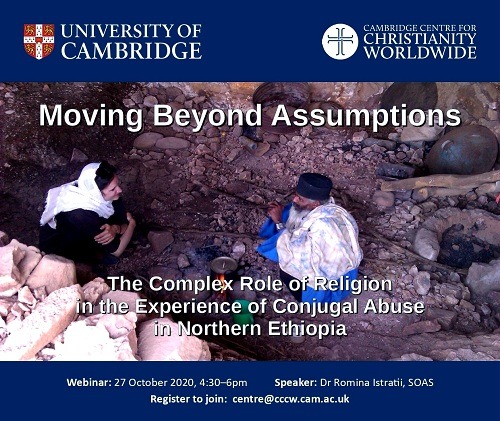
Webinar on ‘The Complex Role of Religion in Experience of Conjugal Abuse in Northern Ethiopia’
Cambridge Center for Christianity Worldwide – 25/10/2020
Dr Romina Istratti of SOAS will be delivering an online lecture on the topic ‘MOVING BEYOND ASSUMPTIONS: THE COMPLEX ROLE OF RELIGION IN THE EXPERIENCE OF CONJUGAL ABUSE IN NORTHERN ETHIOPIA’.
Date and Time – 27 October 2020, 16:30 – 27 October 2020, 18:00
TO REGISTER: EMAIL DIRECTOR@CCCW.CAM.AC.UK
Abstract of the Webinar
In the fields of gender and religious studies and gender and development, religious systems that are based on perceived patriarchal gender models have been almost invariably interpreted as inegalitarian and as conducive to conjugal abuse. Many studies have lacked the proper contextualisation to understand how local traditions have been known and experienced vernacularly in reference to local exegetical systems, failing to recognise the more resourceful aspects of these traditions. MOVING BEYOND ASSUMPTIONS: THE COMPLEX ROLE OF RELIGION IN THE EXPERIENCE OF CONJUGAL ABUSE IN NORTHERN ETHIOPIA
Within so-called Orthodox Christian societies, folklore vernacular experience should not be sequestered from inherited Orthodox tradition, but nor should theology be equated to the routine embodiments of the faithful. This subtle relationship is crucial to recognise when trying to address the continuation of pernicious attitudes towards women, girls or marriage in Orthodox societies. This can be demonstrated in a study of conjugal abuse from Aksum, the historical capital of Orthodox Täwahәdo Christianity in Northern Ethiopia.
Through a discussion of the clergy’s discourses and mediation practices in the conjugal relationship, and the laity’s marital and faith experiences, I will illustrate how religious practice and theology may be strengthening egalitarian gender and conjugal relations. Simultaneously, I will evidence that by remaining grounded in a rigidly upheld folklore ‘culture’ often legitimised in reference to what the laity perceive as their inherited religious tradition, clergy (and laity alike) may contribute to the preservation of norms with potentially pernicious implications for women.
The study stresses the urgency for an approach that understands how laity and clergy deploy religious discourse to maintain practices and social norms and that subtly leverages on apostolic Orthodox theology to facilitate normative, attitudinal and behavioural change.


321118 321023OK first take a excellent look at your self. What do you like what do you not like so a lot. Work on that which you do not like. But do not listen to other people their opinions do not matter only yours does. Function on having the attitude that this is who you are and if they dont like it they can go to hell. 853046
416598 413840An intriguing discussion is worth comment. I do feel which you ought to write read much more about this subject, it will not be considered a taboo subject but generally everybody is too couple of to communicate in on such topics. To yet another. Cheers 651142